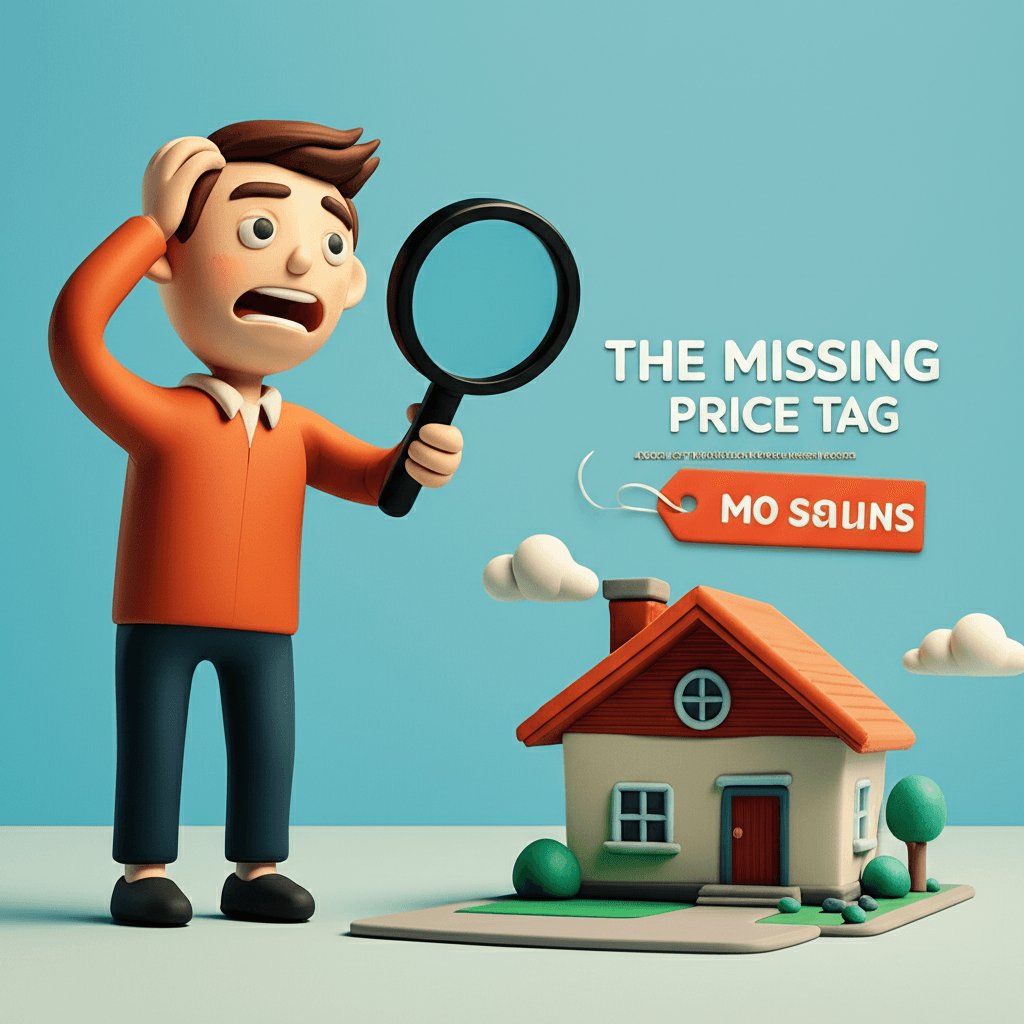The Missing Price Tag: A Guide for Frustrated Aussie Home Buyers
Uncover why 81% of buyers skip listings without a price and learn how to value properties and streamline your search.

Introduction: The Search for Clarity in a Complex Market
Navigating the Australian property market in mid-2025 is a complex task. With fluctuating interest rates and a constant stream of market analysis, buyers are more cautious and information-hungry than ever. You spend hours scrolling through listings, shortlisting potentials, and planning your weekends around open homes. Yet, you're confronted with the single most common frustration in real estate: the missing price tag. Research shows that an overwhelming 78% of Australian buyers cite a lack of pricing on listings as their number one pain point. You are not alone in feeling that your time is being wasted.
This ambiguity isn't just an inconvenience; it's a significant barrier that prevents qualified, eager buyers from connecting with their potential dream homes. It creates a market where inefficiency thrives and trust erodes. This comprehensive guide will pull back the curtain on property pricing in Australia. We'll explore why agents often choose to withhold prices, delve into the negative consequences for everyone involved, and most importantly, equip you with the strategies and tools to confidently determine a property's value and reclaim control of your search.
The Data Doesn't Lie: Why Price Transparency is Non-Negotiable
The frustration with unpriced listings is not just anecdotal; it's a statistically proven phenomenon that significantly impacts the market. Our analysis reveals a staggering statistic: 81% of buyers are highly likely to ignore or scroll past a property that doesn't have a price guide. In a digital-first world, this means a vast majority of the potential market may never even give a property a second glance. For sellers, this translates to missed opportunities and a smaller pool of potential buyers from the outset.
Furthermore, the problem directly contributes to search fatigue. A nationwide survey found that 73% of buyers believe that finding a suitable property is excessively difficult precisely because so many are listed without a price. This figure drops dramatically to just 41% in Victoria, a state with mandated pricing transparency laws, highlighting a clear correlation between regulation and buyer satisfaction. The data paints a clear picture: when buyers are given the information they need, the entire process becomes more efficient and less stressful. In a market where every decision is critical, this initial transparency is the foundation of a successful property journey.

Behind the Curtain: Why Do Agents Withhold Property Prices?
If the data so clearly supports price transparency, why does the practice of withholding it persist? The reasons are often a mix of traditional industry habits, agent strategy, and the complex psychology of negotiating a high-value transaction.
The Outdated 'Volume' Strategy
For decades, a common belief in real estate was that success was a numbers game. The more people who walked through the door of an open home, the better. By not listing a price, the theory goes, you attract the widest possible audience, from bargain hunters to high-end spenders. However, this volume-based approach is becoming increasingly obsolete. It encourages inquiries from people who are nowhere near the property's actual value, wasting the time of the agent, the seller, and the hopeful buyers. A modern, efficient campaign focuses not on volume, but on attracting qualified buyers who are genuinely in a position to purchase the home.
Avoiding the 'Difficult Conversation'
A property is often a seller's most valuable asset, and their attachment to it is deeply emotional. This can lead to an expectation of value that may not align with the current market. Some agents choose to delay the pricing conversation to avoid potential conflict in the first week or two of the campaign. They hope that feedback from the market—or a lack thereof—will naturally 'educate' the seller on a more realistic price point. While this might seem like a way to ease into the process, it's merely delaying the inevitable and can start the agent-seller relationship on a foundation of ambiguity rather than clear, data-driven advice.
A Perceived Negotiation Advantage
Another reason is the belief that an unpriced property creates a stronger negotiating position for the seller. The ambiguity can theoretically generate a 'fear of missing out' (FOMO) and encourage buyers to put their best foot forward without being anchored to a specific number. However, this strategy often backfires. Experienced buyers and those working with a tight budget are often deterred by the lack of information, assuming the property is out of their reach. This can shrink the competitive pool, paradoxically leading to a lower final price than if the property had been transparently priced to attract the right set of motivated buyers from the start.
The High Cost of Ambiguity: How a Lack of Pricing Hurts Everyone
The decision to omit a price guide creates ripple effects that negatively impact all parties in a transaction, undermining trust and efficiency across the board.
For Buyers: Wasted Time and Eroding Trust
The most immediate impact on buyers is wasted time and emotional energy. You might fall in love with a home online, attend the inspection, and even start imagining your life there, only to find out later that it was always hundreds of thousands of dollars outside your budget. This cycle of hope and disappointment is draining and leads to cynicism. In fact, 65% of buyers report that a lack of pricing transparency negatively impacts their perception of the agent. This is a critical point, as today's buyers are tomorrow's sellers. An agent who builds a reputation for being opaque and unhelpful is playing a short-term game that damages their long-term career prospects.
For Sellers & Agents: Attracting the Wrong Audience and Damaging Reputations
For sellers, an unpriced strategy means their property is being shown to a high volume of unqualified individuals. This leads to less meaningful conversations and feedback during the campaign. For agents, transparency is a powerful tool for building a high-performing business. When an agent is upfront with pricing, they spend more time dealing with genuine buyers. This allows them to build stronger relationships, understand buyer needs more deeply, and ultimately deliver a better outcome for their seller. The most successful agents think about their reputation over the next five to ten years, not just the next six months. A career built on trust and transparency inevitably leads to more referrals and a stronger pipeline of future listings.

Your Toolkit: How to Value a Property Without a Price Guide
While the industry slowly moves towards greater transparency, you need practical strategies to navigate the current landscape. Arming yourself with data and asking the right questions can empower you to cut through the noise and accurately assess a property's worth.
1. Ask Targeted Questions
When you engage with an agent, be direct and specific. Instead of asking "What's the price?", which can elicit a vague response, try these questions:
"What comparable sales have you and the owner discussed to establish the likely selling price?"
"Can you provide a list of recent sales in the area that you believe are relevant to this property?"
"Have any offers been submitted, and if so, in what range were they?"
This approach shifts the conversation from opinion to facts and forces a more transparent discussion based on market evidence.
2. Become a Local Market Expert
There is no substitute for on-the-ground research. Attend as many open for inspections and auctions as you can in your target suburbs, even for properties you're not planning to buy. This immersion will give you an intuitive feel for value. You'll learn what a renovated kitchen is worth in that postcode, the premium for a north-facing yard, and which streets command higher prices. Track properties from their listing to their final sale price to understand the difference between asking price and market value. This knowledge is your single greatest asset in negotiations.
3. Leverage Powerful Property Data
Your research should be supported by objective data. It's crucial to look beyond the marketing material and analyze the underlying trends. By using a sophisticated platform that offers deep real estate analytics, you can access critical information like median price growth, average days on market, auction clearance rates, and rental yields for any suburb. This data provides an unbiased baseline, helping you understand whether a property is fairly valued in the context of the wider market. This data-driven approach removes emotion from the equation and allows you to make decisions based on sound financial reasoning, a strategy supported by insights from authorities like the Reserve Bank of Australia (RBA).
4. Use a Smarter, AI-Powered Search
The fundamental problem with unpriced listings is that they break traditional search filters. If you set a budget of $1.2 million, you will miss every relevant property listed as "Contact Agent." This is where modern technology provides a powerful solution. HouseSeeker's AI Property Search transforms this frustrating experience. Instead of relying on rigid price filters, you can search using natural language, like "a three-bedroom house in Balmain with a yard and good transport links for around $1.5m." Our AI analyzes listing details, comparable sales, and market data to find relevant properties, even those without a price tag, giving you a more complete view of the market and saving you countless hours of manual searching.
Conclusion: The Future is Transparent
The frustration over missing price guides is a clear signal that consumer expectations have evolved. Buyers in the mid-2025 market are digitally savvy, data-literate, and have little patience for outdated practices that waste their time. While legislative changes may be slow, the shift in consumer behaviour is already forcing the industry to adapt. Agents and agencies that embrace transparency are gaining a significant competitive advantage, building trust and attracting a higher calibre of clients.
For you, the buyer, the path forward is clear. By combining diligent on-the-ground research, leveraging powerful data analytics, and using intelligent search tools, you can overcome the challenge of unpriced listings. You can step into negotiations armed with confidence and clarity, ensuring you make a well-informed decision on your next home. The power is in your hands to demand a more transparent and efficient property search experience.
Stop scrolling past properties with no price. Take control of your home search with a tool designed for the modern buyer. Explore HouseSeeker's AI Property Search to find properties that match your true budget and lifestyle, and turn frustration into opportunity.
Frequently Asked Questions
Why don't all Australian states mandate price guides on property listings?
Real estate laws are regulated at the state and territory level, leading to a patchwork of different rules across the country. States like Victoria have implemented strict laws requiring a 'Statement of Information' with a clear price guide, while states like Queensland have regulations that prohibit agents from providing price guides for properties going to auction. In New South Wales, it is largely at the discretion of the agent. This inconsistency creates confusion, and while there is industry and consumer pressure for national standards, progress is slow.
If a property has no price guide, does it automatically mean it's very expensive?
Not necessarily. While some agents may omit a price on a high-end property to attract a niche clientele, it is more often a strategic choice based on the reasons outlined above, such as avoiding a difficult conversation with the seller or trying to attract a wide range of buyers. It should be seen as a red flag to do more research, not an immediate disqualifier. The best approach is to use the toolkit in this article to determine its approximate value before investing your emotional energy.
How can an AI tool help me if the agent hasn't even listed a price?
An AI-powered platform excels in this scenario by synthesizing vast amounts of data that go beyond what an agent chooses to display. Our system analyzes the property's features (bedrooms, bathrooms, land size), its location, text descriptions, and photos. It then cross-references this with millions of data points from our real estate analytics engine, including recent comparable sales, suburb trends, and historical data. This allows the AI to generate a confident estimate of the property's value, enabling it to appear in your search results even without an official price guide. For a more guided experience, an AI Buyer's Agent can use this same intelligence to provide personalized recommendations and navigate these complex situations for you.
